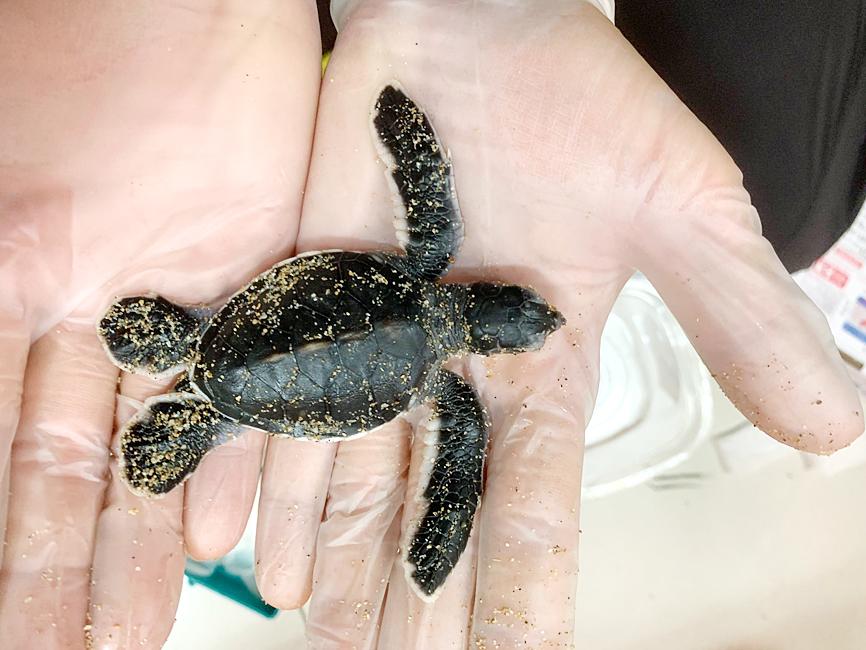Twenty-four baby sea turtles on Sunday night safely returned to the ocean at Kenting National Park’s Dawan Beach with help from government workers and National Museum of Marine Biology and Aquarium veterinarians.
This was the second time since 2017 that baby sea turtles were found in Kenting National Park.
The turtles were discovered on Sunday night by Kenting Chateau Beach Resort employees, who quickly contacted the Kenting National Park Administration Office.

Photo: Tsai Tsung-hsun, Taipei Times
Representatives from the office, coast guard and the museum arrived at the beach, as the turtles were crawling toward the lights at the hotel.
As baby turtles can die of exhaustion if they do not find their way to the sea, staff from the agencies worked to help them along.
After measuring their shells and checking their bodies for injuries, staff used a white container to carry the turtles to the beach and carefully released them into the ocean.
Museum veterinarian Lee Tsung-hsien (李宗賢) yesterday said that the breeding season for sea turtles is from May to October, with the peak occurring in July and August.
Due to topographical changes and abandoned fishnets littering the coastline, sea turtles in the past few years rarely come ashore to lay their eggs in Taiwan proper, he said.
Most turtles lay their eggs at beaches on Siaoliouciou Island (小琉球), Penghu and Orchid Island (Lanyu, 蘭嶼), he said.
Kenting is a natural habitat for sea turtles, but not many frequent the beaches in the park, because the sands are often packed with tourists, making it difficult for turtles to dig holes to lay their eggs, Lee said.
As such, turtle eggs are mostly found on beaches with relatively few people, he added.
Animal conservationists last month found traces that could have been left by sea turtles on Dawan Beach, Lee said, adding that female turtles were probably looking for a proper beach to lay their eggs.
Once they find a suitable place, they tend to return to the same beach six to seven times, he said.
The 24 baby sea turtles probably came from different mothers which laid the eggs about two months ago, he said, adding that more sea turtle eggs could be hatched at the beach in the days to come.
“It is exciting to know that sea turtles have returned to the Hengchun Peninsula again to lay their eggs. We hope that visitors will avoid Dawan Beach at night, when turtles would come ashore,” Lee said. “We will also speak with hotels about dimming their lights so that baby sea turtles would not go astray.”
“Beach visitors should refill the sandpits before they take off and leave no items behind to facilitate the sea turtles’ trips to the beach,” Lee added.

The manufacture of the remaining 28 M1A2T Abrams tanks Taiwan purchased from the US has recently been completed, and they are expected to be delivered within the next one to two months, a source said yesterday. The Ministry of National Defense is arranging cargo ships to transport the tanks to Taiwan as soon as possible, said the source, who is familiar with the matter. The estimated arrival time ranges from late this month to early next month, the source said. The 28 Abrams tanks make up the third and final batch of a total of 108 tanks, valued at about NT$40.5 billion

Two Taiwanese prosecutors were questioned by Chinese security personnel at their hotel during a trip to China’s Henan Province this month, the Mainland Affairs Council (MAC) said yesterday. The officers had personal information on the prosecutors, including “when they were assigned to their posts, their work locations and job titles,” MAC Deputy Minister and spokesman Liang Wen-chieh (梁文傑) said. On top of asking about their agencies and positions, the officers also questioned the prosecutors about the Cross-Strait Joint Crime-Fighting and Judicial Mutual Assistance Agreement, a pact that serves as the framework for Taiwan-China cooperation on combating crime and providing judicial assistance, Liang

A group from the Taiwanese Designers in Australia association yesterday represented Taiwan at the Midsumma Pride March in Melbourne. The march, held in the St. Kilda suburb, is the city’s largest LGBTQIA+ parade and the flagship event of the annual Midsumma Festival. It attracted more than 45,000 spectators who supported the 400 groups and 10,000 marchers that participated this year, the association said. Taiwanese Designers said they organized a team to march for Taiwan this year, joining politicians, government agencies, professionals and community organizations in showing support for LGBTQIA+ people and diverse communities. As the first country in Asia to legalize same-sex

MOTIVES QUESTIONED The PLA considers Xi’s policies toward Taiwan to be driven by personal considerations rather than military assessment, the Epoch Times reports Chinese President Xi Jinping’s (習近平) latest purge of the Chinese People’s Liberation Army (PLA) leadership might have been prompted by the military’s opposition to plans of invading Taiwan, the Epoch Times said. The Chinese military opposes waging war against Taiwan by a large consensus, putting it at odds with Xi’s vision, the Falun Gong-affiliated daily said in a report on Thursday, citing anonymous sources with insight into the PLA’s inner workings. The opposition is not the opinion of a few generals, but a widely shared view among the PLA cadre, the Epoch Times cited them as saying. “Chinese forces know full well that